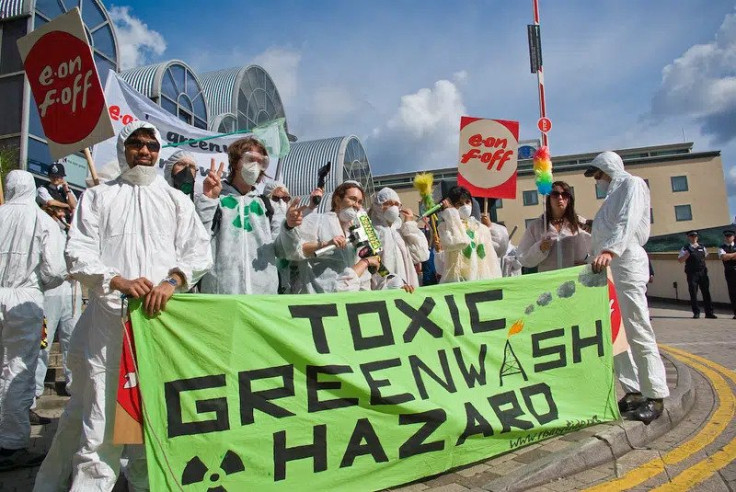Recent report reveals only one in 40 UK companies adopt net zero targets
Only one in 40 UK companies have fully adopted the most challenging "gold standard" targets for setting a course to net zero, a report by the IPPR has revealed.

Only one in 40 large UK companies have fully adopted the most challenging "gold standard" targets for setting a course to net zero, according to a recent report by the Institute for Public Policy Research (IPPR).
The report, titled "The end of greenwashing? Driving decarbonisation in the real economy", warns that slow progress and varied approaches to carbon emissions are jeopardising UK's aim to become the world centre for green finance.
Currently, the UK Government's net zero strategy aims to reduce climate-wrecking emissions and decarbonise all sectors of the economy, in order to meet its target of net zero emissions by 2050.
It now includes a series of "gold standard" targets for businesses, outlined by the Government-convened Transition Plan Taskforce (TPT).
The TPT was established in April 2022, to develop a framework for ensuring that transition plans are detailed enough, credible, actionable and comparable - ahead of the introduction of a mandate for large firms in high-carbon sectors to produce such plans. The mandate was initially set to begin in 2023 but the timeline is now likely to be delayed.
One of their recommendations is a "science-based targets initiative" (SBTi), which emphasises the need for businesses to set interim science-based targets across all scopes to support long-term net-zero plans.
However, according to the IPPR, just one in 20 have signed up in principle for the SBTi.
This means that the vast majority of the claims by companies to be "green" can't be directly compared or are not fully supported by science.
It reflects a growing consensus that businesses are not doing enough to ensure the target of net zero emissions by 2050 is met.
Chris Williams, founder and CEO of ISB Global, a waste management software company, adds that many UK companies aren't doing enough to adapt to changes in legislation.
"They are still using outdated IT systems that fail to provide a comprehensive, joined-up view of the waste and emissions generated by both waste management companies and their customers", he said.
In August, a 600-page assessment of the UK's journey towards Net Zero targets by the Climate Change Committee declared that "goals were being undermined by failures in delivery programmes."
There was a "shocking gap", it reported, in policymaking to drive better insulation of homes. Progress on reducing farming emissions had been "glacial". It concluded that the current strategy will not deliver net zero by 2050, as legally required.
The new IPPR report says the lack of progress by many companies is being masked by "greenwashing".
Greenwashing is the process of conveying a false impression or misleading information about how a company's products are environmentally sound. It can involve making an unsubstantiated claim to deceive consumers into believing that a company's products are environmentally friendly or have a greater positive environmental impact than they actually do.
The report highlights the fuzzy and sometimes contradictory array of ways companies currently claim their progress towards net zero, which it says makes it easier for some companies to "greenwash" their reputations.
Earlier this month, Ernst & Young revealed that 95 per cent of the FTSE100 have not published documents that would meet the TPT's guidance.
Globally, the CDP has stated that less than half a per cent of 18,600 companies that disclosed climate information through its platform last year have a credible net-zero transition plan.

So what is the solution?
The IPPR highlights the role the government must play in enforcing net zero transition plans within large companies.
"Transition plans shouldn't just be a document slid out for investors that no one sees, but a tool that helps government and the private sector work closely together", says Sam Alvis, IPPR associate fellow in its energy, climate, housing and infrastructure team and Fair Transition Unit.
However, he warns that the Government appear to be backing off its pledge to compel large companies to begin some kind of transition planning this year.
Prime Minister Rishi Sunak failed to include the government's net zero strategies in his five key priorities for 2023, and he was reluctant to appear at the November Cop27 Summit in Egypt.
Last week, the UK government faced criticism for its refusal to end plastic waste exports in the next four years, despite the recommendations of Chris Skidmore, following his 340-page review of the UK's net zero plans.
Luke Murphy, associate director for IPPR's energy, climate, housing and infrastructure team and head of the think tank's Fair Transition Unit, believes the government must introduce a new "Office for Climate and Environmental Targets" to establish consistent timelines and ensure continual progress, while publicly blacklisting companies that fail to meet agreed standards.
"This would ensure only companies with truly science-based net zero transition plans are able to call themselves "green" or "net zero", he explains.
A reform such as this would enable government and private firms to work together to make sure the new targets become the universal gold-standard tool used by businesses and international investors.
Last month, the government did update their Green Finance Strategy, which now recognises the key role played by UK-based professional bodies. It is hoped a similar development will follow to support the achievement of the net zero commitment.
The IPPR report also advocates for a further environmental target beyond simply net zero, to ensure that impacts on nature, biodiversity and use of resources are included in the assessment.
At the end of 2022, the government outlined plans for legally binding targets to protect the environment, clean up the air, and rivers and boost nature. They were then published in the Environmental Improvement Plan 2023.
© Copyright IBTimes 2025. All rights reserved.






















